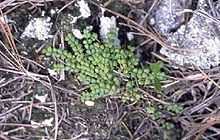Euphorbia deltoidea
| Euphorbia deltoidea | |
|---|---|
 | |
| subsp. deltoidea | |
| Scientific classification | |
| Kingdom: | Plantae |
| (unranked): | Angiosperms |
| (unranked): | Eudicots |
| (unranked): | Rosids |
| Order: | Malpighiales |
| Family: | Euphorbiaceae |
| Genus: | Euphorbia |
| Species: | E. deltoidea |
| Binomial name | |
| Euphorbia deltoidea Engelm. ex Chapm. | |
| Synonyms | |
|
Chamaesyce deltoidea | |
Euphorbia deltoidea (syn. Chamaesyce deltoidea)[1] is a species of flowering plant endemic to Florida in the United States.[2] The taxonomy of the plant is difficult, with some authorities dividing it into four subspecies and some into three; also, it is frequently listed as a member of the old genus Chamaesyce.[2][3] One subspecies, ssp. deltoidea, is a federally listed endangered species called deltoid spurge.[3] It is found only in Miami-Dade County.[2] Another subspecies, ssp. adhaerens, is often included with it under the name deltoidea instead of separately, making it difficult to keep count of how many endangered plants there are.[3] This is generally dealt with by placing the "endangered species" label on any taxon within the species that is limited to Miami-Dade County, however many names they may have.[2]
The deltoid spurge grows in a heavily populated county which has been overtaken by urban development. About 98% of the plant's natural habitat has been drastically altered or destroyed, causing its rarity.[2] The plant grows in South Florida's pine rocklands, an increasingly rare type of forest habitat that is stabilized by periodic wildfire.[4] The plant grows in open, sunny areas and depends on fires to clear away brush and litter that threaten to shade it out.[2] Fire suppression in Miami-Dade prevents this natural fire regime.[2] Other threats to the species include invasive plant species such as Burma reed (Neyraudia reynaudiana).[2]
References
- ↑ GRIN Species Profile: E. deltoidea
- ↑ 2.0 2.1 2.2 2.3 2.4 2.5 2.6 2.7 USFWS. Deltoid Spurge. Multispecies Recovery Plan for South Florida. May 18, 1999.
- ↑ 3.0 3.1 3.2 USFWS. Deltoid Spurge Five Year Review. June 15, 2010.
- ↑ "South Florida Rocklands". Terrestrial Ecoregions. World Wildlife Fund. World Wildlife Fund Report.